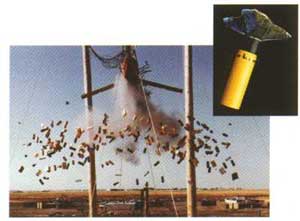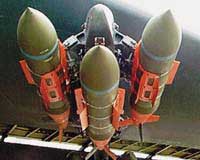 HAJI
BAI NAZAR, February 23 (Online): Two women in this poor
farming village have emerged as heroines after they
witnessed the horror of two small boys being killed as
they played with little cluster bombs from an American
jet. The two cleared dozens of the bombs with their bare
hands and detonated them, protecting the village. HAJI
BAI NAZAR, February 23 (Online): Two women in this poor
farming village have emerged as heroines after they
witnessed the horror of two small boys being killed as
they played with little cluster bombs from an American
jet. The two cleared dozens of the bombs with their bare
hands and detonated them, protecting the village.
Mine removers
learned of their feat when surveying the area for
cluster bomb strikes a few weeks later. "We told them
they were crazy, that they could have been killed," said
Dr. Nasiri, who is with the Halo Trust, a nonprofit
British organization that specializes in removing mines.
The women,
Khairulnisah, 50, and Nasreen, 40, started to gather the
dangerously volatile yellow canisters after the bombing
in 2001 and after they had witnessed the explosion that
killed the two boys and badly injured another child. The
children had been playing with the two-pound bombs that
littered the village.
 Over
several days, the two women cleared 60 or 70 of these
cluster bombs from the immediate area and detonated them
in a hollow at night, according to the villagers'
accounts, which the Halo Trust vouched for. Over
several days, the two women cleared 60 or 70 of these
cluster bombs from the immediate area and detonated them
in a hollow at night, according to the villagers'
accounts, which the Halo Trust vouched for.
In a country where
women are subservient to the men of the family and
excluded from decision-making, the courage of these two
quickly took a place in local legend.
"One man came and
said, `With such a heart, your wife will become prime
minister,' " said Muhammad Isa, the husband of Ms.
Nasreen, with a laugh.
The women are
practical and hard-working, with rough hands and calm
voices. Both said they had decided to clear the bombs
out of concern for their children. "I was afraid my sons
would get injured," said Ms. Nasreen, who was the first
to pick one up.
 "They
were all over the street, and there were 10 in our
yard," said Ms. Khairulnisah, her neighbor. "We were
stepping around the bombs for five days and we were not
touching them. We knew they were dangerous. But after
the children were killed I decided to do something". "They
were all over the street, and there were 10 in our
yard," said Ms. Khairulnisah, her neighbor. "We were
stepping around the bombs for five days and we were not
touching them. We knew they were dangerous. But after
the children were killed I decided to do something".
She added: "The
men could not go close. They were not brave enough to
pick them up and they were running back into the house.
I was not afraid, I was just trusting in God".
The cluster bombs
were dropped during the American operation against
Taliban forces who were occupying the village in October
2001. They are armor-piercing missiles that scatter in
the air from a larger bomb and can shred both humans and
tanks.
 Up
to a third of the bombs do not explode on impact, but
lie on or just below the surface of the ground, and
detonate with the slightest vibration or increase in
heat, mine removers at the Halo Trust said. Up
to a third of the bombs do not explode on impact, but
lie on or just below the surface of the ground, and
detonate with the slightest vibration or increase in
heat, mine removers at the Halo Trust said.
Hundreds were
dropped along the front line near the town of Khojar
Ghar in northern Afghanistan, and The Halo Trust has
spent two years clearing dozens of bomb strikes in the
area. Last fall, they found five new sites on nearby
hills. They are the most dangerous unexploded ordnance
of all, and the agency lost two senior leaders clearing
cluster bombs in 2002.
The women said
they felt endangered by handling the bombs .
Sometimes they
made a noise, sometimes something turned inside, and
that would press on my heart, and I would carefully lie
them back down," Ms. Khairulnisah said. "Those ones I
would pick up with a shovel".
 Ms.
Khairulnisah has "always been like that," said Muhammad
Jan, her husband. "When the bombing was going on, she
would go up onto the roof, saying, `Only God can take my
life.' " Ms. Nasreen said she sensed that the bombs were
full of liquid explosive. "Most of the time when I was
picking them up, they would vibrate and shake my whole
arm," she said. "One was so hot it was burning my hand
and I had to put it quickly in water". Ms.
Khairulnisah has "always been like that," said Muhammad
Jan, her husband. "When the bombing was going on, she
would go up onto the roof, saying, `Only God can take my
life.' " Ms. Nasreen said she sensed that the bombs were
full of liquid explosive. "Most of the time when I was
picking them up, they would vibrate and shake my whole
arm," she said. "One was so hot it was burning my hand
and I had to put it quickly in water".
She collected 34
over three days, putting straw around them each time and
setting fire to small groups of them, causing a big
explosion, as she hid behind a wall.
"I knew they were
dangerous," she said. "I was risking my life for the
life of others. I was sick for nine days after that. I
don't know if it was the gas. It smells so bad it makes
you want to vomit".
When she began
collecting them, she did not tell anyone what she was
doing. But the explosions frightened the villagers, so
she owned up. Her husband and son tried to stop her. "I
will not pick up your body and I will say you committed
suicide," her husband told her.
But she ignored
them.
The men said the
women just did not understand the dangers of the bombs.
"We see the incidents and repercussions of warfare, but
the women don't know," said Abdullah, 18, Ms. Nasreen's
son.
But his mother
dismissed that idea. "That's not true," she said. "I saw
the dead bodies of those children. I knew exactly the
consequences but I thought we should clean the village
of them and protect our children".
|